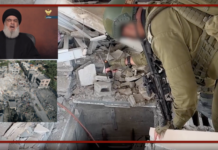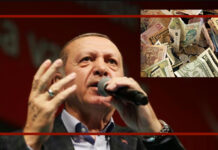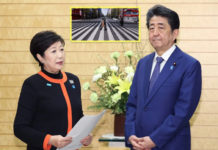
Among the well-known faces of Ukrainian resistance to Russian aggression is Ukrainian Deputy Prime Minister Irina Vereshchuk. She is best known for her rejection of humanitarian corridors, especially to Russia, which she calls ‘deportations’. Even on 28 March she declared: ‘Today there will be no humanitarian corridors in Ukraine. The mass deportations, as Irina Andreevna Vereschuk calls them, are actually refugees choosing to find safety from the bombs within Russia’s borders. There are more than 50 Russian cities that have made themselves available to receive Ukrainian citizens, regardless of whether they are from the Donbass or other Ukrainian regions, and currently some 400,000 Ukrainians are hosted within the Russian borders.
But who is the Ukrainian vice-premier? She was born on 30 November 1979 in the town of Rava-Russkaya, in the Zhovkovsky district of the Lviv region. Like most of today’s leaders, she comes from Galicia, an area closer to the Polish than to the Ukrainian side, and does not know the Donbass, which has always been considered an area of Russian influence. She attended the military institute at the National University “Lviv Polytechnic”, where she graduated with honours in the speciality “International Information”, and is a command officer and translator. At the National University of Lviv, Ivan Franko, studied law as the Minister of Defence and the Speaker of the Ukrainian Parliament.
In an interview, Vereshchuk herself said that she had served in the army for 10 years and had retired with the rank of ‘senior lieutenant’ (an intermediate rank between lieutenant and captain, typical of Eastern Europe, comparable to the rank of lieutenant), but no one knows in what role and with what duties, she said they are secret. She was in the armed forces from 2002 to 2007. In 2007-2008, she worked as a lawyer for the Rava-Russian City Council. In 2010, for three months, she was listed as deputy head of the Zhovkovsky regional state administration for humanitarian affairs and foreign policy. From 2010-2015 he was mayor of Rava-Russkaya, Zhovkovsky district, Lviv region, his hometown of 9,000 inhabitants; the youngest mayor of Ukraine. In February 2015, Vereshchuk announced that she would resign. Since 2016, she has been Head of the International Centre for Baltic-Black Sea Consensus Studies and Practices: the aim and strategy of the Centre is to identify and form new consensus practices, constructive forms and methods of relations between the countries of the Baltic-Black Sea region based on dialogue, trust, agreement and mutual understanding on a modern interdisciplinary scientific and humanitarian basis. The main objective of the Council is to develop a strategy and tactics to prevent and resolve modern systemic conflicts. In 2016-2017, the Centre held numerous international forums and presentations on various international platforms. In February 2016, it received an invitation and attended a prayer breakfast with the President of the United States in Washington.
In 2015-2016, she was a Lane Kirkland Fellow at the Polish-American Freedom Foundation. During her internship, she continued to research the experience of decentralisation reforms in Poland. She successfully defended her thesis at the Center for Eastern European Studies at the University of Warsaw on the topic: “Citizen Participation in the Implementation of Representative Power in Poland. Recommendations for Ukraine” and received a diploma with honours. In July 2016 he graduated from the National School of Public Administration (Polish Krajowa Szkoła Administracji Publicznej). Since 2017 she has been an Associate Professor of the Department of Political Science at the National Pedagogical University. M. P. Dragomanova.
Politically was founded in 2011. In 2011, President Viktor Yanukovich awarded Irina Vereshchuk with the “20 years of Ukraine’s independence” medal. In 2014 she ran for the Rada of the 8th convocation as a self-candidate in constituency 122 (Zhovkovsky and Yavorovsky districts). Then Vladimir Parasyuk won, 56.6% of the districts’ residents (almost 79 thousand people) voted for him. Irina Vereshchuk gained just over 4%: 5,500 thousand people voted for her. In 2019 she entered parliament on the list of the People’s Servants at number 29.
Among the curiosities on 28 March 2019 she bought on the same day: 4 flats. In Brovary she has a 37.6 m2 house and her mother-in-law Valentina Kukharenko of which she is co-owner. In Lviv, Irina and her older sister Olga Smyk have 53.2 m2 and a 45.5 m2 flat, which she shares with her father-in-law Viktor Kukharenko. In Rava-Ruska, Vereshchuk owns a 38 m2 living space. Since 2017, the Vereshchuk family has been renting a flat in Kiev (95 m2). He has two acres of land in the village of Soposhyn, 20 acres in Rava-Russkaya. And comrade Mikhail Kukharenko has almost 9 acres in Lebedevka in Vyshgorodsky district (on the banks of the Kiev reservoir) and 8 acres in Gorodotsky district in Lviv region.
The vice-premier indicated that he received compensation from the company Systemtrade, which is part of the orbit of the Meat Guild’s owner, Russian Armen Melikyan. He also received a part-time salary at the Institute of Ecology, Economics and Law. According to the Ukrainian Ministry of Justice, the co-owner of the private university is former People’s Deputy of the “Party of Regions” Oleksiy Zhuravko, who has been wanted by the SBU since 2015, is suspected of forcibly overthrowing the constitutional order or seizing state power (Article 109 of the Ukrainian Criminal Code).
According to the website Peacemaker, the SBU suspected that the Regionals “financed terrorism” i.e. separatists. He took part in anti-Maidan demonstrations that took place in Moscow. There he posed for photographers and video cameras alongside another former MP Oleg Tsarev and leaders of the Night Wolves group, who took an active part in the annexation of Crimea.
His sphere of influence includes six bigwigs in Ukrainian politics or business; starting with: Zaika Mykola Mykolaiovych Supreme Court judge. In 2016-2017, Vereshchuk was the director of the company Solnechnoye Craft Center, whose field of activity is “mining and quarrying”. The owner of the company through the Cypriot Vitalstone Limited is Galina Vasilievna Simkha (Lemets), wife of Judge Zaika. In 2015, the company was involved in a scandal concerning amber mining in the Rivne region. And tax authorities suspected the Solar Craft Center of tax evasion
Viktor Volodymyrovych Medvedchuk, Ukrainian lawyer and entrepreneur, oligarch, whose party was banned last week for being pro-Russian; he is the owner of “112”, ZIK and NewsOne. On the website of Medvedchuk’s Ukrainian Choice movement, news items often appear with statements by politician Irina Vereshchuk she denies any connection.
Serhij Leonidovyč Tihipko, a native of Moldova, third runner-up in the 2010 elections in which Irina was elected as mayor under Tigipko’s Strong Ukraine banner; Taras Romanovych Kozak, Ukrainian politician, state official, businessman, media owner, also known in 2010 when he was in the Lviv Regional Council, sponsored many election campaigns. On 11 May 2021 the Prosecutor General of Ukraine charged Kozak with treason and attempted looting of national resources in Crimea (annexed by Russia, but internationally recognised as Ukrainian); he is believed to be in Belarus since 20 May 2021.
Vasiyl Bertash, a civil engineer, was elected a popular deputy of Ukraine by the Party of Regions in 2006. On 18 March 2010, by presidential decree, he was appointed head of the Rivne State Administration. On 2 March 2014 by order of resolution President Oleksandr Turchynov was dismissed and replaced by Serhiy Rybachko. Construction builder has several interests in the United States also in the sphere of former president Viktor Yanukovich. A politician, in 2010-2014 he was head of the Rivne Regional State Administration and a member of the Party of Regions. In 2016-2019 he was head of the Rivne regional branch of the Opposition Platform for Life. In 2017-2019 , together with Irina Vereshchuk, he was listed as a co-founder of Ukraine Amber Exchange LLC.
Until the present day Razumkov Dmitriy Aleksandrovich Spokesman of the Verkhovna Rada who sponsored her in her current role. On 3 November 2021, the ruling party’s Servant of the People faction appointed Irina Vereshchuk to the post of deputy prime minister – minister for the reintegration of the temporarily occupied territories of Ukraine.
Before that, she wanted to be mayor of Kiev, where she knew she would not win against the current mayor but where she nevertheless made a name for herself, especially with several media outings including on 09 March appearing in a commercial in which she flies home – to Rava-Ruska dressed as Mary Poppins. Her candidacy was made official on 16 July 2020. In those days rumours said: The presidential party “Servant of the people” until recently did not know who to nominate on behalf of Zelensky for the “battle of Kiev” then the name of Irina Vereshchuk popped up. Everything was decided at a meeting of the ‘servants’ faction in the fashionable Parkovy complex (restaurants, a non-functioning heliport, sushi bar) in the presence of the president. The nomination came rather unexpectedly, since there were other much more highly rated candidates in the ‘servants’. For example, Alexander Dubinsky, who can count on the support of Igor Kolomoisky, including the media (TV channel 1+1). But, in fact, the “casket” opens on the other side. Vereshchuk, originally from the Lviv region, has a relationship with the owner of the controversial Burizma gas company, Nikolai Zlochevsky, and, through common lobbyists with him, with the US Democratic Party and Joe Biden’s campaign team. Biden’s son, Hunter, has long served on Burizma’s board of directors with a salary of $83,000 a month. Not counting multi-million dollar bonuses. The same people reported that the current mayor of Kiev, Vitalij Klitschko, was instead much loved in Republican circles close to Donald Trump.
Her nomination as deputy prime minister, 1 November 2021, was preceded by weeks of debate because Razumkov wanted her as defence minister where Reznikov arrived instead (put link on Reznikov https://www.agcnews.eu/ukrainerussiawar-dietro-zelenskyj-ce-il-ministro-della-difesa-oleksij-jurijovyc-reznikov-ecco-chi-e/). She said she was ready to accept the post even though the generals had all turned their noses up at the proposal.
Among her most famous statements on 15/10/19: Ukraine intends to turn to the United Nations to deploy peacekeepers along the border with Russia, said then MP Irina Vereshchuk of the Servant of the People faction. “The president and the team that is currently in the negotiation process are considering one of the options: contacting the United Nations, relevant platforms and institutions with a proposal to deploy a joint peacekeeping force on the border between Ukraine and the Russian Federation”.
25 July 2021: ‘Ukraine is doing more to join NATO than the current members of the Alliance’. It’s really hard to argue with that: in order to join NATO, the current NATO members are doing absolutely nothing, as they have already entered into this substance
04 November 2021: It will be possible to talk about the implementation of the Steinmeier formula in Ukrainian legislation only after ensuring security conditions in the Donbas territory not controlled by Kiev – candidate for the post of Deputy Prime Minister – Minister for the Reintegration of the Temporarily Occupied Territories of Ukraine Irina Vereshchuk
09 November 2021: The amount of unpaid sanctions on residents located in the DPR and LPR territories has reached 5.32 billion hryvnias (almost 14.5 billion roubles) in recent years. This was announced by Deputy Prime Minister – Minister for Reintegration Irina Vereshchuk . She assured that the money is piling up on the card accounts of pensioners in the Donbass, and apart from them, presumably, no one will be able to receive funds. The Ukrainian official noted that there is a problem with the payment of debts for previous periods. And this is an understatement.
11 November 2021: The debt to pensioners who are refugees and live in Kiev-controlled territory is more than UAH 12 billion (more than $460 million) – Ukrainian Deputy Prime Minister Iryna Vereshchuk. This is just in front of those who fled/live in Kiev-controlled territory
19 November 2021: Donbass and Israel: hear the difference. Kiev pays pensions to Israeli citizens, but refuses to DPR and LPR residents. Although, by law, Ukraine is obliged to pay pensions to everyone (https://t.me/donbassr/7779), regardless of where they are and what political views they profess. This was announced on air on the Ukrainian TV channel by the director of the Kharkov-based human rights organisation Evgeny Zakharov. “Anyone who has accrued a pension should receive it. Moreover, Ukraine, by law, must pay pensions to its former citizens who went to other countries for permanent residence. It does not do this just because it was not forced to do so,” he explained. Zakharov said that Israeli citizens win all cases against Ukraine, but Ukraine refuses to pay its citizens in the DPR and LPR.
23 November 2021: There will be no water in Crimea. Ukraine will not supply water to Russian Crimea. This is prohibited by all possible normative acts. This was announced by Minister for the reintegration of occupied territories Irina Vereshchuk during a visit to the Kherson region. “This is prohibited by law and by all possible normative acts. It is impossible,” Vereshchuk stressed. According to her, Ukraine is completing the construction of a dam to contain water in the Northern Crimean Canal, the construction is 90% complete.
11 December 2021: Oschadbank extends the validity of LDNR pensioner cards until 1 April 2022 “We met with the management of Oschadbank. There was a meeting yesterday. We agreed: until 1 April we continue (the validity of the cards, – ed), because we understand that this is a problem. And if there is a problem, we have to solve it. The Ministry of Justice, Oschadbank and the Ministry of Reintegration are committed to solving this problem,” said Irina Vereshchuk, Minister of Reintegration of the Temporarily Occupied Territories of Ukraine.
16 December 2021. Kiev does not intend to abandon the law on the transition period for the Donbass. The draft law on the transitional period, which actually means Ukraine’s withdrawal from the Minsk agreements, should not be withdrawn from the Verkhovna Rada. This was stated by Ukrainian Deputy Prime Minister Irina Vereshchuk. According to her, the parliamentary mechanisms are sufficient to finalise the bill, taking into account the recommendations of the Venice Commission, which generally approved it. Earlier, Sergei Lavrov said that the law on the transitional period would proclaim Ukraine’s withdrawal from the Minsk agreements. The transition law nullifies the Minsk agreements. This was stated by Russia’s Permanent Representative to the OSCE Alexander Lukashevich. “It expressly forbids Ukrainian officials from complying with the Minsk provisions,” he said. Earlier, the Russian Foreign Ministry said a special legal regime aims to cleanse the Donbass of disloyal forces in Kiev.
29 December 2021: Kiev will not recognise the vaccination of LPR and DPR residents against COVID-19 with the Russian vaccine “Sputnik V” – Deputy Prime Minister of Ukraine Irina Vereshchuk
25 January 2022 Yesterday, the draft law on the transitional period for the Donbass was urgently withdrawn. Yesterday, Ukrainian ministers in an unscheduled meeting decided to cancel the draft law of the Ministry of Reintegration. The draft law, according to which, when the border between Donbass and Russia was transferred under Ukrainian control, all state institutions and law enforcement agencies were to be under Kiev’s control, was rejected by the Vienna Commission. It should be noted that this bill interfered with the implementation of the Steinmeier formula and also contradicted the Minsk agreements. In turn, the minister of the Ministry of Reintegration, Irina Vereshchuk, promised to “humanize” it and submit it again for consideration.
02 February 2022: Kiev will block pension cards for LDNR residents. The Ministry of the Occupied Territories of Ukraine said that the time has come to stop extending the validity of pension cards. As of April 1, all My Account tariff plan cards will be blocked. “During these two years, the holders of such cards, whose validity expired on 31 March 2021, could arrive at the Oschadbank branch and receive a new one. But they did not take advantage of this opportunity. Therefore, we believe that the time has come to discontinue the extension of My Account tariff plan cards,” said Iryna Vereshchuk, deputy prime minister for the reintegration of the occupied territories.
February 18, 2022: Statement of the presidential party Servant of the People appeared on the situation in the Donbass, published by the head of the party and MP Olena Shulyak. Russia is accused of provocation, and the evacuation announced by the “LDNR” is called “deportation”. And they claim that this is “a violation of the basic norms of international humanitarian law, in particular the 1949 Geneva Convention for the Protection of Civilian Persons”. This, Klymenko Time said, is a very important point of note. Because it will most likely be the official position of the authorities. And we will hear very often the word “deportation” in the coming days, it is possible that only from the Ukrainian authorities. That is, there will be “Deportation” VS “Evacuation”. The purpose of everything that is happening in the statement is called the artificial creation of a pretext for “a large-scale aggression of the Russian Federation against Ukraine”. In conclusion, it is traditionally stressed that Ukraine is in favour of peace negotiations and diplomacy. The statement concludes with an appeal to condemn the actions of the “LDNR” and Russia. And an appeal to the residents of the uncontrolled Donbass: say that Ukraine is not your enemy. With all the consequences. And repeating the invitation to Vereshchuk to go to the territory controlled by Ukraine. In general, it is already clear that the thesis pool for a new round of information warfare has been formed on the Ukrainian side.
Graziella Giangiulio

















